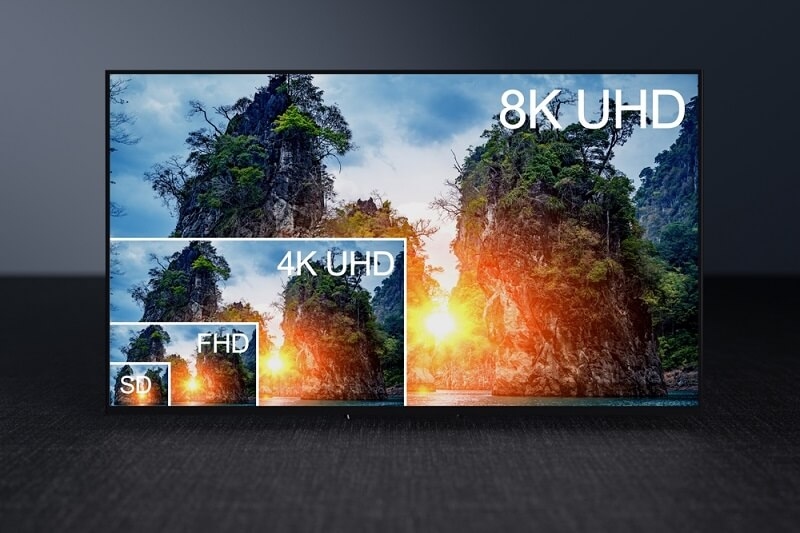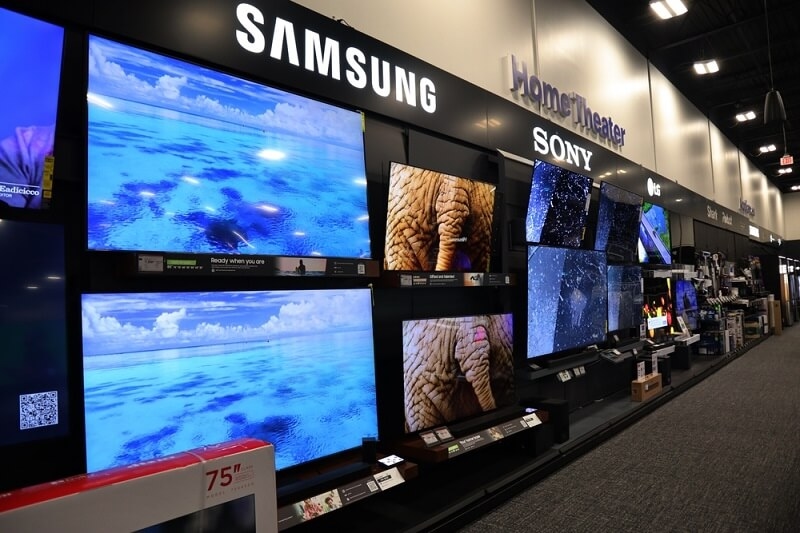
TVs are varied beyond ever as the world today is very tech savvy. In breathtaking visuals and unbelievable detail, there are two TVs that prevail, that is, 4K and 8K. However, which one will be best to fit into your house? This guide will assist you in making the decision by dissecting the differences between 8K TV vs 4K and whether you should upgrade it at all.
When we come to the comparisons we should know what these labels reflect actually. 4K vs 8K TV resolution comparison is all about pixels and clearness. So let us examine this further.
The resolution of a 4K TV is 3840 x 2160. It implies that the screen has more than 8 million pixels in total. 4K is also referred to as Ultra HD and will provide a resolution that is 4 times higher than Full HD (1080p). This is now the most popular television resolution at the domestic level.
The size of an 8K television is 7680 x 4320 pixels. That makes more than 33 million pixels, or 4X what a 4K TV has. This is an increase in detail, more depth, and an easier image. However, one thing to keep in mind is that it is not always better all the time because the resolution is increased.
Now that we know the basics, let’s look at the 4K vs 8K TV resolution comparison side by side. This will help you understand how these TVs differ in performance.
8K TVs deliver sharper images with finer details than 4K TVs. However, most content available today is in 4K, not 8K. That means you may not notice a huge difference unless the content is made for 8K.
The benefits of 8K are more noticeable on larger screens (75 inches+) and when sitting close to the screen. If you have a smaller TV or sit farther away, the difference between 4K and 8K is minimal.
8K TVs often come with advanced AI upscaling technology. This means they can enhance 4K or even 1080p content to look better on an 8K screen. Still, it’s not true 8K quality — it's just an improvement of lower-resolution content.
A common question among buyers is: 4K vs 8K, is it worth it? The answer depends on your needs, budget, and viewing habits.
Right now, most movies, TV shows, and games are made in 4K or lower. Streaming services like Netflix, Prime Video, and Disney+ mainly support 4K content. There is very limited 8K content available. So, if you're buying an 8K TV today, you might not fully enjoy its potential just yet.
8K TVs are much more expensive than 4K TVs. You can get a top-quality 4K TV for a reasonable price, while 8K TVs are still seen as luxury products. Ask yourself if you’re ready to pay extra for future-proofing or if a 4K TV meets your current needs.
8K content, due to its massive resolution, requires faster internet and more storage space. Streaming 8K video smoothly demands very high-speed connections — something not every home may have.
Let’s look at real-world feedback from users who have experienced both types of TVs. This 4K vs 8K TV review section focuses on what matters most to everyday viewers.
Most users say that 4K offers amazing quality for movies, sports, and games, especially on screens between 50 to 75 inches. People who own 8K TVs often agree that the visuals are stunning, but only under ideal conditions (like very large screens and high-quality content).
Gamers love 4K TVs because many modern consoles are optimized for 4K. Native 8K gaming is rare and not yet supported by most games. If you're into gaming, a fast 4K TV with good refresh rates may offer the best experience.
When comparing 4K TV vs 8K TV in terms of value, 4K generally wins. It provides excellent picture quality, wide content support, and a better price point. 8K is still growing and might be better for those who want to invest in the future of TV.
Suggested reading: Smart TV Showdown: Samsung vs LG vs Sony for Entertainment

So, how do you choose the best one? In this section, we break down your choice based on needs, space, and lifestyle. Let’s explore 4K vs 8K — which TV is right for you?
Here’s a simple breakdown of the 8K TV vs 4K pros and cons to make your decision easier.
Pros
Cons
Pros
Cons
Also read: OLED vs Mini-LED: Which Display Technology Reigns Supreme?
Choosing between a 4K vs 8K TV depends on your budget, content needs, and the size of your screen. For most users, 4K is still the best choice because of its affordability, widespread support, and excellent visuals. 8K TVs are exciting, but they’re best suited for tech enthusiasts or people who want to be ahead of the curve.
If you’re upgrading from an older Full HD TV, a 4K model will feel like a huge leap. If you already have a 4K and are wondering about the next step, only consider 8K if you want a very large screen and are ready to pay a premium.
A lot of services are trying 8k, however, a few more years 4K will still be a standard. 8K content still remains in the development stage.
When used in real life, there are slight disparities when it comes to the real world unless you have a very huge TV or sit near the monitor. 8K is clearer, but only in certain situations.
The distinction in the fight of 8K TV vs 4K can be a winner. In case you are interested in a great-looking image but at a very affordable price, then 4K is your choice. However, in case you are interested in new start-tech and readiness for the future, and money is not a significant factor, then 8K can be a good choice. In any case, you will get a cool contemporary TV viewing experience with lovely visuals.
This content was created by AI